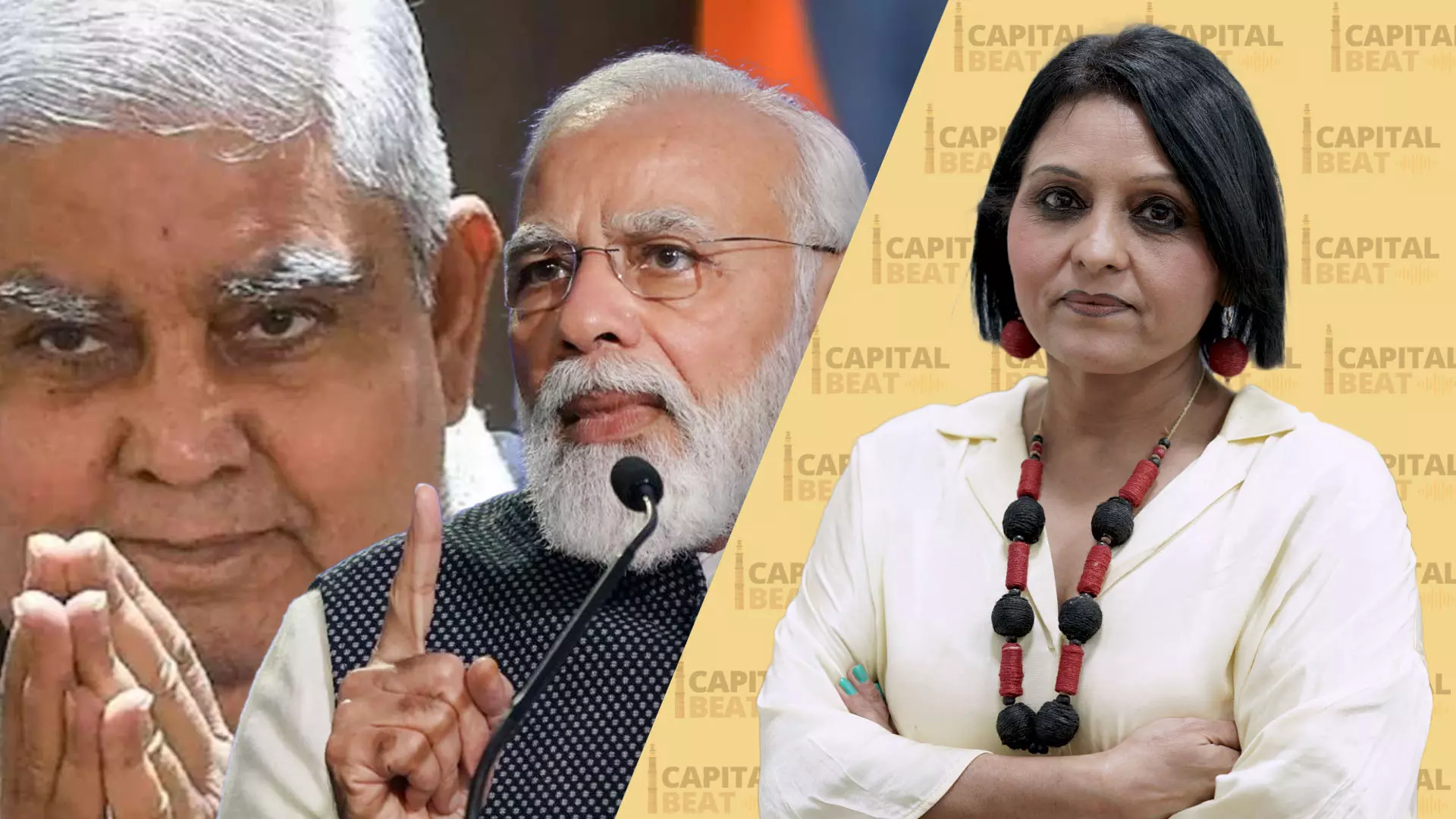
Dhankhar's exit, first 'blood on carpet' moment for Modi regime? Capital Beat
Was resignation triggered by single event or pattern of totalitarian governance, where dissent is unwelcome? What to make of Modi's 'curt' tweet? Will Dhankhar talk?

The Federal's Political Editor Puneet Nicholas Yadav and senior journalist Anand K Sahay unpack the political mystery behind Jagdeep Dhankhar's abrupt resignation as Vice President in the latest episode of Capital Beat.
On Tuesday (July 22), Prime Minister Narendra Modi finally broke his silence on the resignation with a tweet: "Shri Jagdeep Dhankhar Ji has got many opportunities to serve our country in various capacities, including as the Vice President of India. Wishing him good health."
The timing, content and subdued tone of the message have raised eyebrows and sparked surprise nationwide. What's happening in the political corridors?
Layers of speculation
Dhankhar's resignation, officially attributed to health reasons, has raised eyebrows across political circles. Puneet Nicholas Yadav pointed out that while mainstream media and government sources floated conflicting stories, the decision had less to do with health and more with political tensions. The government's cold response, particularly Modi's unemotional tweet, only added fuel to speculation.
Yadav dismissed reports of Dhankhar refusing a farewell, stating that once a resignation is accepted, such procedures are moot. Instead, the focus should be on the "serious concerns" surrounding his departure and what it reveals about power dynamics inside the BJP.
Timeline of dissent
Yadav provided a detailed account of events leading up to the resignation. Dhankhar's conduct in the Rajya Sabha on the morning of the resignation aligned with his usual pro-government stance—rejecting Opposition motions under Rule 267 and accepting a BJP motion under Rule 167. But things changed drastically when Dhankhar unexpectedly admitted an Opposition-led impeachment motion against Justice Yashwant Verma.
Also read | Mystery of why Dhankhar resigned, and who will replace him as Vice President
This decision visibly shocked treasury bench members, including Law Minister Arjun Ram Meghwal, who was caught unprepared on the floor. Yadav inferred that this unscripted deviation might have prompted backlash from the party's top brass.
Fallout with BJP brass
Soon after, Dhankhar chaired a Business Advisory Committee (BAC) meeting which top BJP leaders JP Nadda and Kiren Rijiju skipped. This was widely seen as an affront. Opposition leaders, including Jairam Ramesh, expressed dismay at the apparent breakdown in communication.
According to Yadav, such deliberate absence pointed to growing tensions between Dhankhar and the ruling establishment.
A social media-fuelled theory about a closed-door meeting at Rajnath Singh's residence also surfaced but lacked verifiable details. Yadav cautioned against over-reliance on speculative online chatter, emphasizing the need for substantiated reporting.
Institutional silencing?
Turning to a broader analysis, Anand K Sahay described the resignation as indicative of deeper structural issues within the BJP. He suggested Dhankhar's exit wasn't triggered by a single event but reflected a pattern of totalitarian governance, where dissent is unwelcome and non-conformity is punished.
Also read | Jagdeep Dhankhar and 6 other sudden high-profile exits under Modi govt
Sahay referred to Dhankhar's tenure as one of subservience, implying that even loyalists are disposable if they misstep. He described the resignation as the first "blood on the carpet" moment in over a decade of Modi's leadership, raising concerns about authoritarian drift.
Quiet discontent within BJP
Sahay went on further to say that BJP MPs themselves are growing discontent with their voiceless roles. Despite being elected, they often find themselves powerless, reduced to rubber stamps.
He cited internal discussions in Nagpur post-election as evidence of suppressed dissent within the party.
Yadav echoed this sentiment, noting that while public murmurs from within the BJP may be rare, the silence signals underlying fear and frustration. He questioned whether Dhankhar might eventually become a whistleblower akin to Satyapal Malik, though such an outcome remains uncertain.
Will Dhankhar speak out?
The panel concluded that the key to unraveling this saga lies with Dhankhar himself. If he chooses to speak, it could validate suspicions of institutional overreach and internal conflict. If he remains silent, the resignation may be absorbed into the BJP's pattern of opaque governance.
As Yadav succinctly put it, the mystery isn't just about why Dhankhar resigned, but whether India will ever get to hear the real reason behind it.
The content above has been transcribed from video using a fine-tuned AI model. To ensure accuracy, quality, and editorial integrity, we employ a Human-In-The-Loop (HITL) process. While AI assists in creating the initial draft, our experienced editorial team carefully reviews, edits, and refines the content before publication. At The Federal, we combine the efficiency of AI with the expertise of human editors to deliver reliable and insightful journalism.

